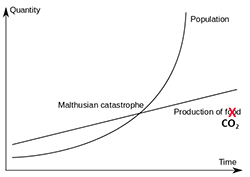
"The power of population is indefinitely greater than the power in the earth to produce subsistence for man."
Reverend Malthus
In 1968, Malthus appeared in a new update form, in Paul Ehrlich's Population Bomb which warned that
“The battle to feed all of humanity is over. In the 1970s hundreds of millions of people will starve to death in spite of any crash programs embarked upon now.”
Malthus returns now cloaked in climate change’ as “carbon legacy.” The concern is no longer a lack of resources, but of ever increasing waste products. Travis Reider, PhD., an ethicist at Johns Hopkins is spreading the Malthusian alarm on a platform provided by NBC when he states, “We need to stop pretending kids don't have environmental and ethical consequences.”
Dr. Reider argues that every child we bring into the world comes with their own carbon footprint and the only way to effectively, responsibly reduce carbon emissions, in this ‘last chance’ before cataclysmic global warming, is to reduce the number of children being born. Distressing news for those of us pushing for grandchildren or contemplating children of our own. And what is the evidence? Short answer, none; the evidence is based upon projections of estimates.
Reider first cites Reproduction and the carbon legacies of individuals which calculates “carbon legacy” – the carbon emissions our children and their children will create. The authors do multiple mathematical approximations for the 11 most populous countries, utilizing individual fertility rates, life expectancies and per capita carbon emissions. Lots of assumptions and estimates. But fuzzy numbers yield only fuzzy forecasts, no matter how precise they appear. They say as much.
“The choice of scenarios [for continued carbon emissions] has enormous effects, leading to a wide range of projected carbon contributions. This is dissatisfying, but it reflects the large variability and volatility of projections…”
Children amplify the total worldwide carbon emissions, how could they not? More carbon emitters (people) result in more carbon that math is straightforward. Our children’s carbon legacy calculated to be 9441 tons is far, far higher than the puny 56 tons contributed by a Bangladeshi child.
More significantly, they believe that carbon legacy is massively more substantial than any possible savings on carbon emissions from increasing car’s fuel economy, 148 tons, or even recycling at 17 tons. The only means to impact the problem now, today, is to stop having those carbon-emitting children.
But “carbon legacy” fails to consider what I would call “legacy improvement.” We have seen a 14% reduction in the period 2005 to 2015, projecting legacy improvement, admittedly fraught with the same fuzziness as carbon legacy would reduce that 9441-ton contribution and be more balanced. But balance is not necessarily the intent. Food production is second only to energy in producing carbon emissions and accounts for a portion of the US “carbon legacy.” Who should be allotted those emissions? The producer or the consumer. Carbon legacy provides no accounting.
Using these fuzzy and biased calculations, the theme that current measures fall woefully short is expanded upon in, The Climate Mitigation Gap: Education and Government recommendations miss the most effective individual actions. The authors have stratified individual efforts to reduce carbon emissions by their impact. Here are their projections and estimates.
|
High Impact Action |
Reduction in annual carbon emissions (kg) |
|
Have one fewer child |
23,700-117,000 |
|
Live car-free |
1000 - 5300 |
|
Avoid one plane flight |
700-2800 |
|
Eat a plant-based diet |
300-1600 |
There is some good news though, the projections of the carbon savings from not having a dog were too ambiguous even for them to stratify. So, Fido stays, junior, well technically a potential junior, goes.
All of Malthus and his gloomy prophecy has returned. Carbon emissions are harmful, the most significant source of those emissions is another human, the point of no return is upon us. Dramatic population reduction is the only path given the neo-Malthusian math. Malthus’ model was correct given its assumptions. But Norman Borlaug and his colleagues overturned those assumptions finding a technologic means of feeding a growing population. The neo-Malthusians believe that without a clear, readily achievable technologic solution, the risk is too high and out of an abundance of caution we must act now to restrain population growth. Dr. Reider frames it this way,
“having many children is wrong, or at least morally suspect, for standard environmental reasons: Having a child imposes high emissions on the world, while the parents get the benefit. So, like with any high-cost luxury, we should limit our indulgence.”
For an ethicist, this is both a terse and pejorative summation. At the very least failing to address who and how those limits are to be achieved. While Dr. Reider's goal may be to move the conversation forward, practical and ethical concerns like the devil are always in the details. Let me ask the next unspoken question, whose kids? By the math of carbon legacy my potential child is equivalent to 26 Nigerian children, is there to be a child carbon credit?
By reducing our high carbon emitting population, we could open our resources of education and mobility to less advantaged people. But when these people migrate to more developed countries, their carbon legacy increases, they become significant carbon emitters too. Should that be a call to ban immigration?
High carbon-emitting countries could reduce their production and exportation of carbon, reducing food and material exports. But wouldn’t that adversely impede the social and economic prosperity of those low carbon emitters that rely on those exports?
Do we insist that the highly reproductive countries, reproduce less? But these are frequently the poorest, least white countries, doesn’t it suggest elements of ethnic cleansing for the greater good?
If there is a moral imperative to reduce carbon emissions why haven’t we reduced travel, used available mass transit or renounced meat sources of protein? These are not so biologically driven. Who will be the first to give up the reproduction’s biologic imperative?



